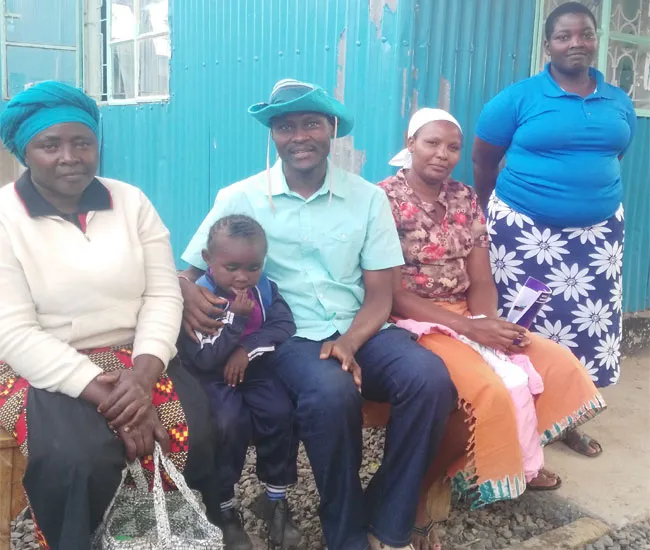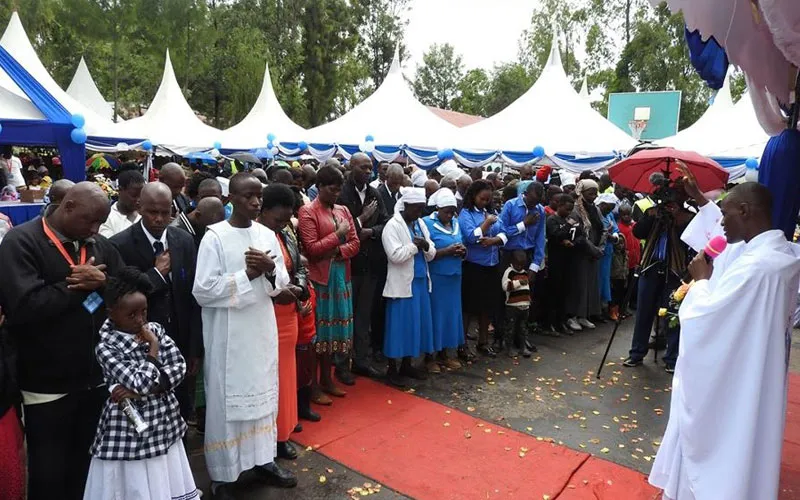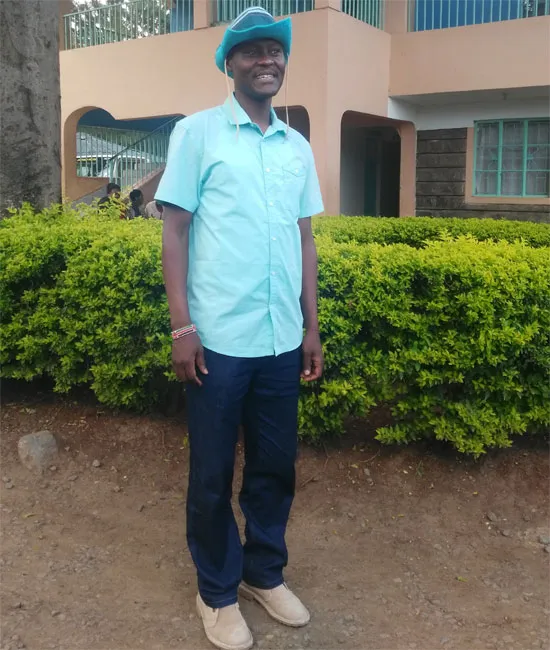This, Fr. John says, has led to an increase in prostitution among underage children in the slum who are left to fend for themselves when their parents fall sick.
Other forms of crime such as substance abuse and child trafficking are also common in these parts of the city.
“There have been many cases of parents selling their children with as little as KSh2,000.00 (USD20) just to afford a meal and other basic amenities. Cases of child trafficking are very common in this place,” he says.
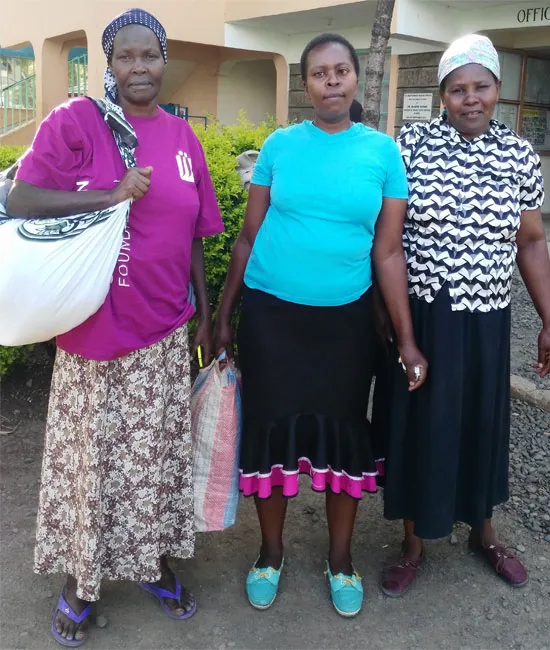
Also rife, are cases of broken families, according to the Kenyan priest who has welcomed abandoned women and children in the feeding programme.
(Story continues below)
“There is a day that a woman came to this church carrying a naked new-born baby. The woman was crying, saying that the husband had abandoned them and that they had been sent away from their house because of unpaid bills,” he recounts, adding, “I have never seen a more desperate scenario. But I am glad that the volunteers came in and ensured that the woman and her child were fed and dressed and they had a place to stay.”
Before establishing base in Mukuru Kwa Njenga where the Spiritans cover other surrounding informal settlements including Mukuru Kwa Reuben, Sinai, Lunga Lunga and Pipeline, members of the Congregation of the Holy Spirit (the official name), who were the first Catholic missionary order to evangelize Kenya had been to other places, ministering to slaves and introducing the people to formal education and farming.
Established to operate in “places where the Church has difficulty in finding workers”, according to Fr. John, the Holy Ghost Fathers first set foot in Mombasa, a coastal town in Kenya, in 1889 at the height of slave business in Africa. They settled in the East African coastal town of Bagamoyo in Tanzania where they ministered in villages that were occupied by slaves on transit.
The name Bagamoyo in Swahili meant “where slaves left their hearts”, before they were ferried across the Indian ocean to work for their masters abroad.
The Spiritans’ mission, according to Fr. John, was to liberate these slaves while they were still in these villages along the coastal town.
“The villages in Bagamoyo were referred to as Freedom villages,” he narrates adding, “The work of the missionaries was to buy the slaves from their slave masters and to educate them in the villages without putting them at the risk of being resold in the event that they went back to their homes.”
At the end of slave trade in the late 19th century, the missionaries ventured inside the country, travelling on a train through major towns in Kenya before they settled in Nairobi where they immersed themselves in building schools and churches and introducing people in different places to farming.
The missionaries whose projects are anchored on Faith, Education and Agriculture are behind the construction of Holy Family Minor Basilica Cathedral church located at the heart of Kenya’s capital, Nairobi, the Holy Ghost Cathedral at Kenya’s coastal town, Mombasa and the Holy Ghost Cathedral, Machakos in the Catholic Dioceses of Machakos.
The Spiritans also constructed St. Mary’s School in the Catholic Archdiocese of Nairobi where President Uhuru Kenyatta studied. Other schools include Mang’u High School and Kabaa High School, also top schools in Kenya.
The missionaries’ arguably biggest success, however, is the introduction of coffee farming in the East African country.
“Since we were the first ever missionary congregation in Kenya, it wasn’t easy getting people to jump on a faith they had never known before. But farming is what everybody could relate with. In fact, the missionaries had more success in promoting coffee farming than they did, faith,” says Fr. John.
Highlighting some of the projects undertaken by the group of volunteers at St Vincent de Paul Group, the Spiritan from Kenya's Catholic Diocese of Meru says, “Apart from the feeding programme, we mentor the needy economically and help them start small businesses to earn their livelihoods.”
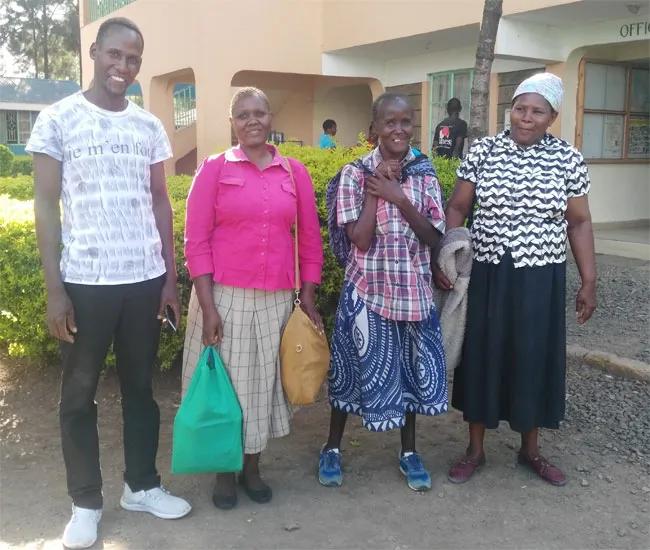
The group also runs a water project and a toilet to provide free services to the slum residents.
In its future plans, the group intends to start distributing ready-made food in a daily feeding programme that will target the sick who can’t make it to the parish to get the weekly donations.
The biggest challenge that Fr. John faces every day is not being able to satisfy the needs of slum residents who come looking for assistance at the parish. This, he attributes to insufficient resources.
“The need is there. People in this part of the city are really suffering. But there is only so much we can do for them,” he says, adding, “At the moment, we rely solely on the Sunday offertory and a few individual donations from slum residents who don’t have much to offer but who donate deeply from their hearts. It is from these donations that we provide the needy with. But there are needs that we can’t meet. Such as facilitating treatment for the sick.”
Highlighting the frustrations, which he endures every day, the priest says, “It is heartbreaking not being able to meet all the needs of the people who come here trusting us to help them. But it also satisfies my heart that I give my whole every day. I chose to become a part of this community and now I must participate in their daily struggles.”
The Catholic priest who joined the Spiritan community of St. Mary’s Catholic Parish in Mukuru Kwa Njenga while serving as the financial administrator (bursar) of the Spiritan Province of Kenya had also ministered in the Archdiocese of Mombasa as well as Marigat in Kenya’s diocese of Nakuru.
Ordained in 2008 after completing his theology studies in Paris, France, Fr. John says the work with volunteers of St. Vincent de Paul Group is inspired by the message of the scriptures.
“The Gospel of Matthew Chapter 25, which says in part, ‘I was hungry and you gave me something to eat, I was thirsty and you gave me something to drink, I was a stranger and you invited me in, I needed clothes and you clothed me, I was sick and you looked after me, I was in prison and you came to visit me’ inspires us every day when we attend to the needy in this deprived area,” the Kenyan Spiritan cleric says.
This story was first published by ACI Africa on 08 March 2020
Agnes Aineah is a Kenyan journalist with a background in digital and newspaper reporting. She holds a Master of Arts in Digital Journalism from the Aga Khan University, Graduate School of Media and Communications and a Bachelor's Degree in Linguistics, Media and Communications from Kenya's Moi University. Agnes currently serves as a journalist for ACI Africa.
